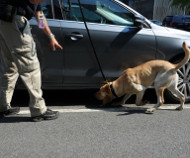12/16/2014
US Supreme Court Allows Traffic Stop Searches When No Law ViolatedUS Supreme Court holds that traffic stops and searches may be conducted even when police officers are wrong about the law.

Police officer may stop and search drivers who have done absolutely nothing wrong. In an 8 to 1 decision Monday, the US Supreme Court ruled that a police officer can be wrong about a traffic law being violated, but the stop will be upheld as valid as long as he the officer's mistake was "reasonable."
"An officer might, for example, stop a motorist for traveling alone in a high-occupancy vehicle lane, only to discover upon approaching the car that two children are slumped over asleep in the back seat," Chief Justice John Roberts wrote. "The driver has not violated the law, but neither has the officer violated the Fourth Amendment. But what if the police officer's reasonable mistake is not one of fact but of law?"
Surry County, North Carolina Sheriff's Sergeant Matt Darisse thought the Ford Escort he saw on Interstate 77 on April 29, 2009 was breaking the law because its right-side tail light did not illuminate. Sergeant Darisse was wrong.
North Carolina only requires that one brake light be functional. Once the Escort was on the side of the road, the ensuing search turned up drugs and Nicholas Brady Heien was arrested. The high court justices declined to throw out Heien's conviction simply because the driver had been mistakenly pulled over. The justices noted that the adage "ignorance of the law is no excuse" still applies to the situation at hand.
"If the law required two working brake lights, Heien could not escape a ticket by claiming he reasonably thought he needed only one; if the law required only one, Sergeant Darisse could not issue a valid ticket by claiming he reasonably thought drivers needed two," Justice Roberts wrote. "But just because mistakes of law cannot justify either the imposition or the avoidance of criminal liability, it does not follow that they cannot justify an investigatory stop."
In her dissenting opinion, Justice Sonia Sotomayor said this creates a troubling precedent when combined with past decisions that allows police to conduct searches on pretexts, as long as there is a real violation of the law.
"Giving officers license to effect seizures so long as they can attach to their reasonable view of the facts some reasonable legal interpretation (or misinterpretation) that suggests a law has been violated significantly expands this authority," Justice Sotomayor wrote. "One wonders how a citizen seeking to be law-abiding and to structure his or her behavior to avoid these invasive, frightening, and humiliating encounters could do so."
Conservative groups, including the Rutherford Institute, echoed the liberal justice's criticism.
"By refusing to hold police accountable to knowing and abiding by the rule of law, the Supreme Court has given government officials a green light to routinely violate the law," said institute president John W. Whitehead.
A copy of the decision is available in a 160k PDF file at the source link below.


